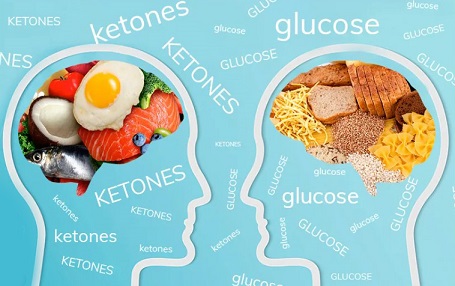Nikhil Prasad Fact checked by:Thailand Medical News Team Jun 02, 2024 10 months, 3 weeks, 3 days, 3 hours, 59 minutes ago
Medical News: Recent research from the Del Monte Institute for Neuroscience at the University of Rochester has uncovered promising findings about ketones' impact on brain function. This study, led by Nathan A. Smith, MS, Ph.D., focuses on how ketones can enhance cognitive function and protect brain networks, particularly in the hippocampus, a critical area for learning and memory.
 Ketones: A Boost for Brain Health
Understanding Insulin Resistance and Brain Health
Ketones: A Boost for Brain Health
Understanding Insulin Resistance and Brain Health
As we age, our brains often become less responsive to insulin, leading to a breakdown in communication between neurons. This decline can result in mood changes, cognitive impairments, and eventually neurodegenerative diseases like Alzheimer's. The research team aimed to understand the early stages of these changes and how to prevent or delay them.
Smith told Thailand
Medical News, "We need to identify when neuronal function first becomes impaired. This study helps us get closer to understanding how to rescue impaired neurons and prevent devastating diseases like Alzheimer's."
The Role of the Hippocampus
The hippocampus is a well-understood region of the brain responsible for learning and memory. The researchers used mice to model how insulin resistance affects this area. They found that sudden insulin resistance disrupts several critical neuronal functions, including:
-Synaptic activity
-Axonal conduction
-Network synchronization
-Synaptic plasticity
-Action potential properties
These processes are essential for the smooth flow of communication within the brain.
Ketones to the Rescue
When the researchers introduced D-β-hydroxybutyrate (D-βHb), a type of ketone produced when the body burns fat instead of glucose, they observed remarkable improvements. The disrupted synaptic activity was restored, axonal conduction increased, neurons resynchronized, and synaptic plasticity improved.
"This research has implications for developing ketone-based therapies for conditions involving insulin resistance, like diabetes or Alzheimer's disease," Smith explained. "We are now looking to understand the role of astrocytes and other glial cells in acute insulin resistance."
Ketones and Brain Metabolism
The brain typically relies on glucose for energy but can switch to alternative fuels like ketone bodies (KBs) when glucose is scarce. This switch doesn't depend on insulin, making KBs a valuable alternative fuel source. Previous studies have shown that ketones can alleviate neurological and cognitive issues related to metabolic disorders, but the specific mechanisms were not well understood.
To explore these mechanisms, the researchers induced acute insulin resistance in mice by blocking a glucose transporter called GLUT4. This led to decreased synaptic activity and long-term potentiatio
n (LTP), impaired axonal conduction, and disrupted neuronal synchronization. However, when they administered D-βHb, these functions were restored, highlighting ketones' potential protective effects.
Implications for Treatment
This study suggests that ketone-based therapies could target specific neuronal dysfunctions in conditions involving insulin resistance. These findings are particularly relevant for diseases like diabetes and Alzheimer's, where insulin resistance plays a significant role.
"Our results provide unique insight into using KBs as an inexpensive and relatively risk-free treatment for metabolic disorders and insulin resistance," Smith said. "Further research in this area could lead to more effective therapies for these conditions."
Broader Context and Future Directions
Over the past two decades, research on insulin signaling in the brain has gained importance in studying type 2 diabetes (T2DM) and Alzheimer's disease (AD). Insulin plays a critical role in memory formation, particularly in the hippocampus. Systemic insulin resistance can interfere with hippocampal metabolism and cognitive function, contributing to cognitive decline associated with aging, T2DM, and AD.
The hippocampus is rich in GLUT4 receptors, the primary neuronal insulin-dependent glucose transporter. Insulin enhances GLUT4 translocation across neuronal membranes, promoting memory formation. However, impaired glucose uptake in the hippocampus can lead to cognitive decline.
The Ketogenic Diet and Brain Health
The ketogenic diet, which promotes the production of ketones, has shown benefits for cognitive function in patients with T2DM or AD. These benefits may arise from several factors, including reduced neuronal firing rates during ketosis, increased energy availability, and reduced production of free radicals.
Exogenous ketones, such as D-β-hydroxybutyrate ester, can increase ketone levels without the strict dietary requirements of the ketogenic diet. Studies have shown that these ketones can enhance brain activity and stabilize functional networks, even in healthy adults.
Exploring the Mechanisms
To understand how ketones affect the brain, the researchers used a murine model of acute insulin resistance. They found that insulin resistance increased the frequency of synaptic events, consistent with previous findings that suggest presynaptic glycolysis is essential for maintaining synaptic transmission. Impaired glycolysis leads to slower and smaller action potentials and depolarization of the resting membrane potential.
Interestingly, when D-βHb was introduced, the frequency of synaptic events remained high, but the amplitude decreased, suggesting a reduction in synaptic vesicles. This finding aligns with reports that ketones promote the conversion of glutamate to GABA, a neurotransmitter that reduces neuronal excitability.
Conclusion
The research highlights the potential of ketones to enhance brain function and protect against the detrimental effects of insulin resistance. These findings could pave the way for new treatments for metabolic disorders and neurodegenerative diseases, offering hope for improved cognitive health in aging populations.
A New Hope for Cognitive Health
As the prevalence of conditions like diabetes and Alzheimer's continues to rise, understanding and utilizing the protective effects of ketones could revolutionize treatment approaches. By exploring the mechanisms behind ketones' benefits, researchers can develop targeted therapies that support brain health and enhance quality of life for millions.
The study findings were published in the peer reviewed journal PNAS Nexus.
https://academic.oup.com/pnasnexus/article/3/5/pgae196/7675459
For the latest about Cognitive Health, keep on logging to Thailand
Medical News.
Read Also:
https://www.thailandmedical.news/news/anti-aging-news-u-s-scientists-identify-nutrients-that-can-slow-brain-aging
https://www.thailandmedical.news/news/breaking-covid-19-news-study-of-eeg-signals-shows-that-most-post-covid-individuals-have-reduced-brain-activity
